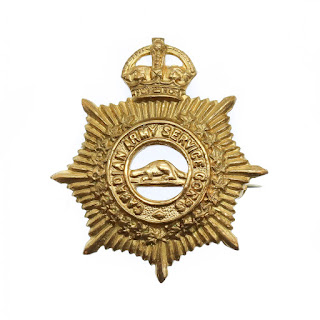Sgt. Robert J. Webster
77th Battalion/136th Battalion/Canadian
Forestry Corps.
Regimental Number 145058
Robert
John Webster was born on March 26th, 1895 in Warsaw, Ontario. He was
the son of Thomas Webster and Mary Anne Finnie.
As
a young man, Robert enlisted and served for several years in the U.S. Army,
seeing action in both the Spanish-American War (1898) and the Philippine
Rebellion (1899-1902). By 1901, Robert was back in Dummer Township,
living with his parents and siblings on their farm. On October 10, 1906,
Robert married Effie McGowan in Hastings, Ontario, and they would later make
their home in nearby Lakefield, Ontario at 6 Reid Street.
Robert
was residing with Effie and his four children in Lakefield, when he enlisted in
the 77th Battalion in Rockcliffe, Ottawa, Ontario on September 14th
1915. Webster was 41 years old at the
time and listed his 7 years of previous military experience, and that he was a Wesleyan. Robert
stood 6 feet tall, sported a fresh complexion, gray eyes and light brown
hair. After being inspected by a medical
board, he was declared fit for overseas service.
Little
is recorded of Robert’s time with the 77th Battalion or why he
enlisted with an Ottawa area battalion rather than one recruiting closer to
home. The answer to this might be that
the 77th recruited Webster for his experience. For though he entered the battalion with the
rank of private, he was very quickly promoted (within 2 days) to the rank of
Master Sergeant within a couple of days and to Company Sergeant Major by the
end of October. Webster’s extensive experience in soldiering and military routine
while in the United States Army, would have been essential for this position,
which was the senior non-commissioned officer, largely responsible for
administration, standards and discipline for the entire battalion.
Webster
served with the 77th until February 1st 1916, at which
time he was transferred to the 136th “Durham” Battalion. He would continue to serve as the Company Sergeant
Major in that battalion, until it sailed for overseas on September 25th.
Upon
arriving in England, Webster and his battalion were placed in West Sandling
Camp, where it became apparent that, like many other Canadian battalions, they
would be broken up and their ranks used to reinforce the battalions already
fighting at the front. As was common
practice, Robert reverted his rank to Private at his own request when he was
transferred to the 39th Reserve Battalion stationed at Shoreham,
England on October 6th.
After
a little over a month with the 39th, Robert was then assigned to the
37th Battalion and taken on command with the 1st Canadian
Training Battalion at Hastings on December 17th and then to the 1st
Canadian Labour Battalion a day later. As
this move coincided with a promotion to Acting Sergeant, it is likely that he
was assuming a role of training troops during this time.
Another
month would pass before Webster would proceed to France with the 1st
Canadian Labour Battalion on January 9th, 1917. This battalion was, as its name implies, predominantly
used to provide manpower to the Engineers in the construction of railway lines,
road building, tunneling, trench work, excavations, etc., freeing up the
younger more fit men to serve on the front.
He arrived in La Havre on January 9th, 1917.
By
mid-February Webster was back in England, his service file shows that he was
taken on strength to the 2nd Canadian Convalescent Depot at Hastings,
though this was likely as a service role as there is no records showing that he
was wounded or ill during this time. He transferred to the 3rd
Canadian Casualty Depot at St. Leonard’s on June 14th.
Webster’s
next move came on September 18th when he was attached to the
Eastern
Ontario Regiment. A week later he transferred
to the Canadian Forestry Corps at Sunningdale Camp, Berkshire. Acting Sergeant Webster would return to
France, this time with the 78th Company of the Canadian Forestry
Corp on October 1917. He served in this capacity
for the remainder of the war until returning to England in December of 1918.
He
sailed for Canada on May 2, 1919.
Webster later returned to Lakefield and returned to his role as Chief of
police.
Sources
Canada. "Military Service File
of Robert John Webster." Library and Archives Canada, Ottawa: Record Group
150, Accession 1992-93/166, Box 10194 - 33. Item Number 623061.
John Robert Webster. Lakefield War
Veterans [webpage]. https://lakefieldwarvets.ca/webster-robert-john/. Accessed December 12 2021.














